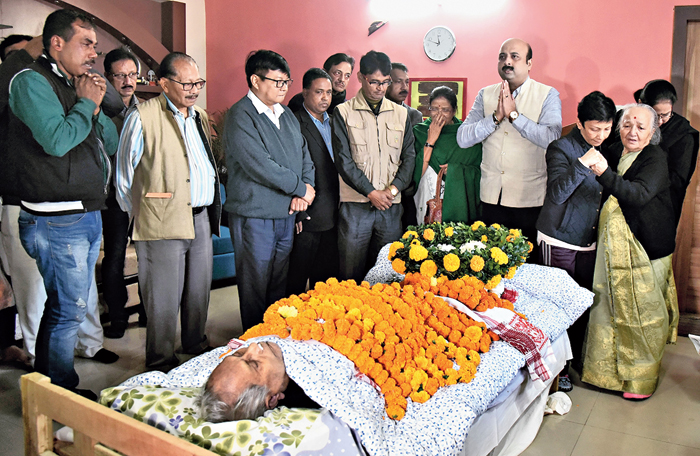Cultural personality Ratna Ojha recited a poem last week in his frail voice at Latasil playground at an anti-Citizenship Amendment Act (CAA) protest organised by painters and poets.
After reciting Moi Kon (Who am I), Ojha observed that with their joining, participation of people from all walks of life in the protest was complete.
That was the last public meeting the 88-year-old writer and theatre personality had attended. On Monday night he felt uneasy at his residence in Manik Nagar and his family members rushed him to a nearby private hospital where the doctors declared him dead around 1am. He is survived by his wife and three daughters.
As the news of Ojha’s death spread, his friends and followers, including Assam chief minister Sarbananda Sonowal, rushed to his residence. They recalled his patriotism, contribution towards construction of Srimanta Sankaradeva Kalakshetra and to various fields of the cultural world of the state.
“Ojha had shown what patriotism is to those who do not love their country and people,” said singer Surya Das recalling his participation at the Latasil protest despite being wheelchair-bound.
An AASU delegation visited Ojha’s residence and offered their hearse to take his body to various places of the city before proceeding to Navagraha crematorium. At Ojha’s residence, Sonowal’s press adviser Hrishikesh Goswami announced that the Assam government would accord him a state funeral.
“He was at the forefront of the Assam Movement. He attended the anti-CAA protest at Latasil in a wheelchair, giving us encouragement and strength. We will move forward inspired by his patriotism,” said AASU chief adviser Samujjal Bhattacharjya.
Born on December 5, 1931 in Barpeta district, Ojha graduated from Cotton College and started working in Assamese daily Xantidut. He worked as a teacher for a brief period and news editor at the Guwahati centre of Doordarshan before joining Bongaigaon Refinery as a public relations officer.
Known for his street plays like O phul, o phul nuphulo kiyo, Amaak ejon Oxomiya lage and Signboard, Ojha formed a drama group Gohbor Natyagoshti. Besides, he had a number of plays and novels to his credit. He was well known for his association with cultural icon Bhupen Hazarika who had made him assistant director in three of his movies — Pratidhowni, Sikmik Bijuli and Loti Ghoti.
“Ojha could clarify any doubt regarding Bhupen Hazarika,” said former president of Asam Sahitya Sabha, Kanak Sen Deka.
Ojha was part of the Srimanta Sankaradeva Kalakshetra general council and was associated with the Northeast Zonal Cultural Centre. He was also the vice-chairman of the Bhupen Hazarika Cultural Trust. “Today we are proud of the Kalakshetra. When it was being built between 1991 and 1995, Ojha supervised the construction as its vice-chairman. He took due care on how to reflect the contributions of our saints in the Kalakshetra,” said Debabrata Saikia, the leader of the Opposition in the Assembly.
Ojha was honoured with the Natyasurya Award in 2005.
In a condolence message, Sonowal said he was “deeply saddened” by the demise of Ojha, who “profusely enriched the mosaic of Assamese art and culture during his lifetime”.











